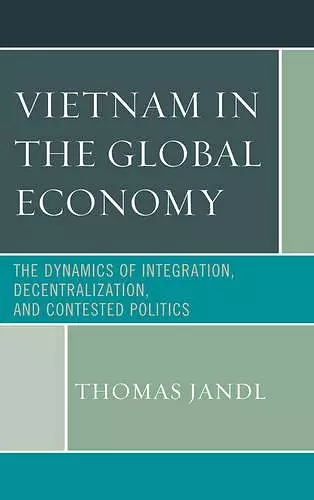Vietnam in the Global Economy
The Dynamics of Integration, Decentralization, and Contested Politics
Format:Paperback
Publisher:Lexington Books
Published:15th Oct '15
Currently unavailable, and unfortunately no date known when it will be back

This book is, in essence, about incentives: the incentives for competing societal interest groups to cooperate with each other to benefit from a growing economic pie, rather than fighting over a bigger share of a smaller one. This is the conundrum of economic development. If elite interest groups have both incentive and ability to allocate resources toward themselves, and if such rent seeking causes a decline in economic inefficiency, how can economies ever grow? The book illuminates the mechanisms by which in one of the world’s recent economic success stories— Vietnam’s rapid industrialization and passage into the middle-income category—the interest in cooperating to grow the economy overrode the elites’ instinct to allocate resources through the use of political power. The book shows how the need to provide positive conditions for international investment altered pay-off structures and pushed the all-powerful Communist Party of Vietnam to engage in bargaining with provincial officials; provincial officials with international investors; and finally all coercive elites even with the working classes. It describes the emergence of a harmony of interest among societal groups in which each group benefits from a growing economy, and no one group can monopolize the benefits of growth without hurting itself. The Vietnam case validates Nobel-Prize winning economist Mancur Olson’s proposition that elite predation can only be kept in check when the elite itself suffers from the economic decline it causes at least as much as it gains from the rents it collects.
Beginning in 1986, Vietnam's party leaders reversed course and introduced a series of economic reforms. Jandl analyzes these momentous changes by examining the whys and hows. The thus far successful reforms have pulled millions out of mass poverty to create a middle-class country, not a Marxist workers' paradise. The author reports that by the mid-1980s, the ruling party's legitimacy was rapidly eroding due to the country's declining economic performance and worsening living conditions, compounded by recurring famine. Initiating reforms became one survival option for party elites, and soon success became contagious. Interprovincial competition set off a race for more market opening and deregulatory measures. Economic development via decentralization, liberalization, and privatization became the mode. This also helped Vietnam attract foreign capital. Jandl concludes that such 'success was serendipitous' and never centrally planned. He purposely focuses on the successful phase of reform (still unfolding) to 2008, the year of the global financial crisis that battered the regional economies. . . .This volume sheds much light on the timely issue of distinguishing among the state-led development experiences in Asia. Summing Up: Recommended. Graduate through professional collections. * CHOICE *
Vietnam in the Global Economy is an extraordinarily fertile resource for PhD candidates, a book rich with propositions just begging to be tested. Jandl's analysis of what has gone before [in Vietnam] provides an essential foundation for understanding these events. * Contemporary Southeast Asia *
Jandl’s timely book on post-war Vietnam focuses on the reasons for the success of the 1986 reforms. He argues that these reforms credibly committed the central government to a devolution of power and authority to the provinces in the form of market-preserving federalism. This devolution provided the basis for competition among sub-national governments that led to sub-national public goods provision, the attraction of foreign investment, and competitive production for international markets. Jandl shows how the reforms harmonized the major interests in society, reducing the possibility of a political backlash against the reforms. This is an important work for the study of the East Asian model of growth and political development more generally. -- Barry R. Weingast, professor & chair of the Department of Political Science, Stanford University
ISBN: 9781498525374
Dimensions: 228mm x 153mm x 23mm
Weight: 490g
312 pages